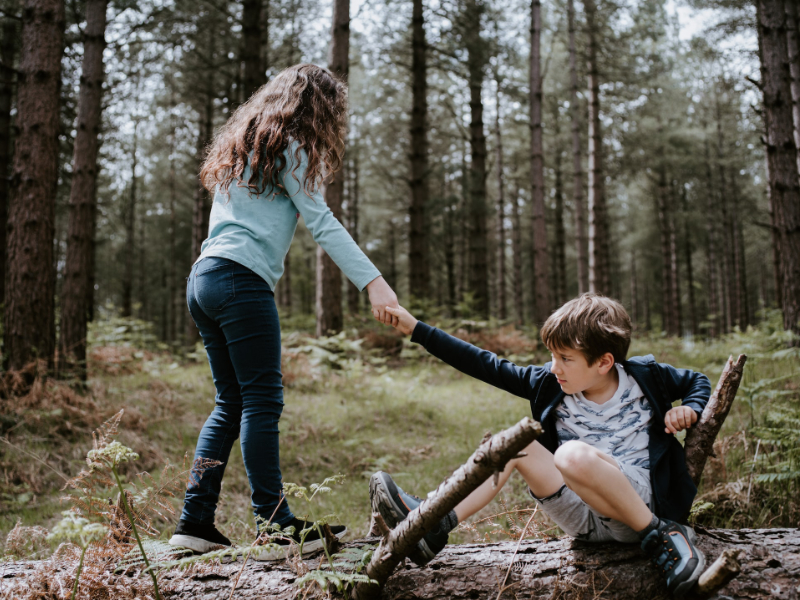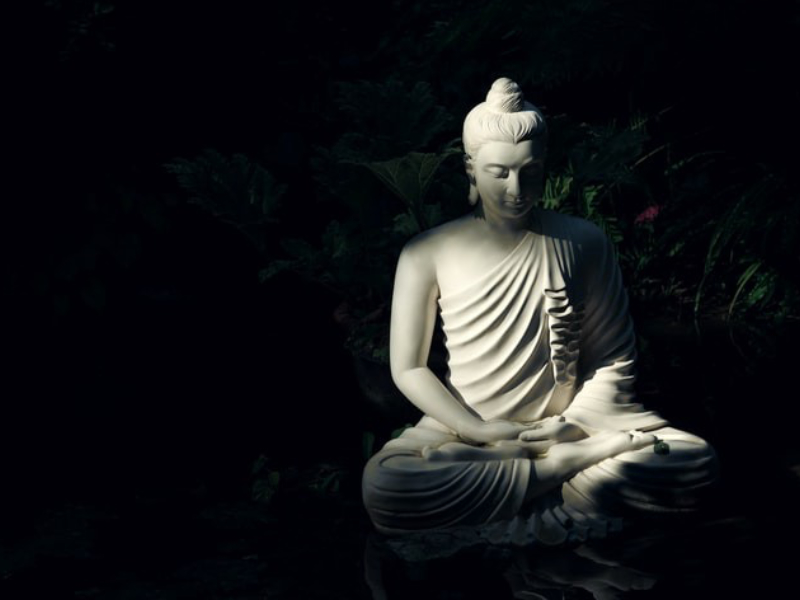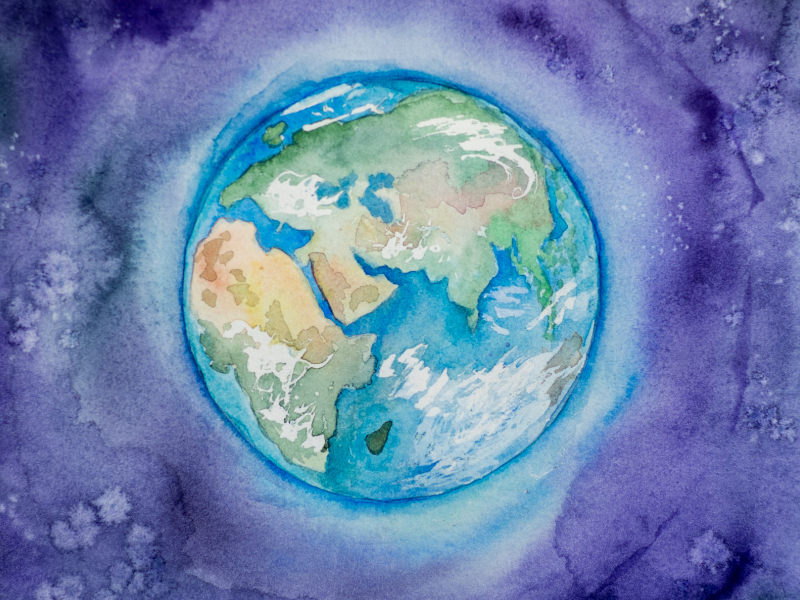Acting For Freedom
– The Noble Eightfold Path | Right Action –

TODAY, WE ARE GOING TO START exploring our actions in the world, as they relate to the Buddha’s Eightfold Path. Together with our speech and livelihoods, our actions compose the second of three arenas of training along the Path — training in Virtue.
And, as with all the other dimensions of our training, we are training to liberate our hearts, to free ourselves from suffering, to embody lasting peace. This is often misunderstood or forgotten when we turn to this arena of our training since it can sound dogmatic talking about what we should and shouldn’t do. So, let me linger on this point for a moment before we jump into the juice.
* * *
In most religions, our actions are judged as good or bad, usually by God or one of his prophets. Buddhists, though, avoid this framing. Instead, they look at actions as either skillful or unskillful means to alleviate suffering in your heart and mind. So, there’s no real authority aside from you.
I highlight this because so many of us in the West have been conditioned to think of religious codes as ultimate declarations of good and bad behavior, as prescriptions or recipes to enter heaven or win god’s favor. So, again, I just want to encourage you to keep your eye on the ball—at the aim of our practice; to free our hearts from suffering.
If freedom is what you want, the Buddhist code is merely an invitation to explore for yourself if specific actions lead onward to peace. There are no hard and fast rules here, only guiding principles to help us along.
Now, no doubt, while some of you may despise any set of rules, others of you may really appreciate the structure and clarity rules provide. My son, for example, who is quite literal, appreciates clearly defined instructions in all arenas of life. There is an element of safety for a lot of people to be given directions, whether it be the recipe for enlightenment, to get into heaven, or even how to behave in a specific social setting.
So, let me address both types of people here — those who despise rules and those who appreciate the structure they provide. First, for those who like the structure, the Buddha does offer a clear code of conduct to help prevent unnecessary suffering in our lives. He is one of the clearest thinkers and communicators I know, and is methodical in his investigation. So, there is plenty of structure to keep you grounded and directed.
But — and this ‘but’ is also meant to address those who despise rules — the spirit or idea behind the Buddha’s code of conduct goes far beyond any list of dos or don’ts. Again, the rules are not ultimate declarations. They are guiding principles to support you in your pursuit of freedom. So, as we move through this section, keep in mind the wise words of the singer-songwriter Amos Lee:
Skillful Action | Four Skillful Precepts
Okay, the Buddha’s code consists of four precepts. They are:
- Abstain from killing and causing physical harm
- Abstain from taking what is not given
- Abstain from sexual misconduct
- Abstain from abusing alcohol and other intoxicants
Your first reaction to these precepts is likely, “Duh!” And you’re right. These are no-brainers. They weren’t created by the Buddha. You can find these in many cultures throughout history. They are human universals. Every kid knows this without having to be told. They know it in their heart of hearts.
But look around. Look at the state of the world. We are still plagued by war, violence, and terrorism. We are gluttonous consumers, taking from the earth without mercy. How many of our fathers and brothers still sexually abuse our sisters and children? How many of our loved ones are drowning in alcohol, desperate for unconditional love and compassion?
We may all start with pure hearts as children. But kids grow, and the world corrupts us. Fear corrupts us. Anger and hatred corrupt us. Greed corrupts us. Suffering corrupts us.

As Galway Kinnell says, then, “sometimes it is necessary to reteach a thing its loveliness.” We need to address the fear, anger, greed, and suffering within each of us and work toward healing it. How? Well, it begins with mindfulness. We must first open to and accept all the pieces of ourselves. We must understand those hurt, fractured, and isolated pieces, so we can extend our compassion and forgiveness to them, so we can transform them back into love.
The bulk of this episode, then, will be plea to love yourself. Responding to a question about how we can treat ourselves less harshly, Ram Dass said:
“Part of it is observing oneself more impersonally… When you go out into the woods and you look at trees, you see all these different trees. And some of them are bent, and some of them are straight, and some of them are evergreens, and some of them are whatever. And you look at the tree and you allow it. You see why it is the way it is. You sort of understand that it didn’t get enough light, and so it turned that way. And you don’t get all emotional about it. You just allow it. You appreciate the tree.
The minute you get near humans, you lose all that. And you are constantly saying, “You’re too this, or I’m too this.” That judging mind comes in. And so I practice turning people into trees. Which means appreciating them just the way they are.”
For this part of our training, training our actions, observing ourselves more personally means opening awareness to our habits and routines, not with judgment, but with an understanding of our particular conditioning.
Then, because our old habits carry inertia, we’ll need to put in some effort to break that inertia, to rebuild our patterns. To do this, because the old habitual energy will often be very strong in the beginning, when we first start training, it can be skillful to stick strictly to the precepts. Otherwise, if we’re too loose, our clever ego will figure out all kinds of work-arounds. We will too easily be pulled into our old routines.
It’s kind of like how kids need strict rules, like ‘Don’t run into the street or touch the curling iron or take things from strangers.’ Kids need this strict structure because they haven’t cultivated an understanding of the potential harm. And their curiosity and impulses to act are just too strong. As kids get older, though, they realize their parents’ rules weren’t just dogmas. They existed to prevent them from harm. From this point on, then, the once-child-now-adult no longer needs to stick strictly to the rules. They have a skillful habitual foundation to keep them protected. So now, instead, they can live according to the rules’ underlying principle, which sometimes even means breaking the rule.
The same is true on our spiritual path. Some of our habits are strong and can lead us to a lot of suffering, like reaching for alcohol or, in my case, weed. And when we don’t have another strong structure in place, we can easily get captured by our unskillful patterns. Once we break our old patterns, though, and discover for ourselves if these precepts lead us to peace and freedom in the heart — or if in some situations or contexts, they don’t — we too, like the once-child-now-adult, can transcend the ‘rules’ and instead live by the principles the rules are meant foster.
Let me hover here for a moment. Because, right now, as a culture — and really all cultures; as a global society — we are quickly moving away from the moral and religious institutions that have stood before us for hundreds of years. We are outgrowing many of the religious outfits of our past. And for good reason.
But in times of great cultural change like now, when we start to question old rites and ethics, I think it’s important to try to articulate what purpose these religious rites and ethics were meant to serve and to what efficacy they are achieving that purpose before we simply toss them out. Often what I have found is that there is a kernel of truth and value to them. Their framing just needs to be updated and tweaked a bit to fit our modern world. And the dogma, authority, and superstition needs to be taken out of them.
I say this to open you not only to the Buddhist precepts but to all the world’s religions and wisdom traditions. I believe there is wisdom in all of them. So, I invite you to explore with fresh eyes the norms and ethics of your own cultural upbringing too.
Just remember to keep your eye on the ball — is this rite or ritual causing harm and suffering or is it leading onward to peace? Stay connected with your personal integrity and responsibility, so you don’t get lost in the seduction of your desires and impulses or in the confusion, pressure, and fearmongering of the world’s authorities.
Though the world’s religions offer much wisdom, but to be honest and holistic, they are also causing a tremendous amount of harm, abuse, and violence. Many atrocities are committed under the name of one god or another. Daughters are being stoned to death by their fathers. Gays are being hung publicly in the streets in the Middle East, they are prohibited from marrying in many parts of the world, and even here in the West, they are being kicked out of their homes, and denied unconditional love — the very essence of god or divinity. All around the world, women are forced into childbearing, forced into silence, forced to cover their faces and bodies, denied leadership positions, and denied the freedom to make decisions about their own bodies. Arranged marriages are still forced on our children. And, behind all this, there is doctrine stemming from the world’s gods. Our religious books aren’t perfect. Address them honestly. And throw out and criticize what is harmful. Remember from our episode on speech, it is also harmful speech when you remain silent and don’t stand up for the injustices and harms being committed in the world.
Anyway, I hope my words help you connect to a moral code in your own unique and personal way.
Okay, well, today let’s just look at the first precept.
Abstaining From Physical Harm
“Avoid taking life and abstain from it. Without stick or sword, conscientious, full of sympathy, desire and pursue the welfare of all sentient beings.” — The Buddha
Killing and causing physical harm are easy to see and understand. But this precept goes much deeper. Really, it is about living in harmony with life, about honoring and holding reverence for it. So, there are many subtler dimensions to explore than just refraining from hitting, biting, scratching, and clawing.
But what is common to all acts of violence, crude or subtle, which I invite you to explore for yourself in your own life, is that there is almost always an element of fear at its root. Most often, then, the antidote is Love. Love sits at the core of non-harm. Where fear creates violence, discord, and harm, love creates support, harmony, and safety.
“Perfect love casts out fear.” — Jesus
And this applies not only out in the world but in our own hearts and minds. We need to love all the pieces of ourself. When we resist loving ourself, when we judge and demoralize parts of ourself, we cause all kinds of harm to ourselves and others.
When, for example, you are a harsh disciplinarian to yourself, like me, because some piece of you feels worthless if you don’t produce something or accomplish something every minute, you will feel the pressure, yes. But others around you will feel the same pressure on them to produce. If you are overly self-critical and -judgmental, again, everyone feels the criticism and judgment. But if you are light-hearted, forgiving, and compassionate with yourself, others will feel the same ease, acceptance, and safety when they are around you.
“Ultimately we have just one moral duty: to reclaim large areas of peace in ourselves, more and more peace, and to reflect it towards others. And the more peace there is in us, the more peace there will also be in our troubled world.” — Etty Hillesum, a young holocaust victim
Another thing is that, when we can’t extend love to ourselves and face our own problems, we often turn outward and focus on others to hide from our own problems. Rather than face ourself, face our self-hate, our hurt, our shame, our grief, we sometimes try to ‘help’ or ‘fix’ other people. And sure, this can help for a time. We can get a sense of achievement, pride, or even holiness for ‘helping.’
But, in the end, this can end up hurting the very person we’re trying to ‘help’. When we ‘help’ or ‘fix’ others, we often think we know what’s best for them. I catch myself imposing my values on others all the time, thinking I know what they want or need. But the truth is, I have no idea. I’m not them.
I don’t know what they like or want or value. I don’t know what brings them happiness and pleasure and satisfaction. Sure, I may point to certain things that can bring them peace and freedom. But they need to want that and seek it for themselves. I can’t force it on them. It’s been an important lesson for me to learn to not teach or preach to anyone but, instead, to simply take an interest in people, to try and understand them, to love them.
No man can reveal to you aught but that which already lies half asleep in the dawning of your knowledge.
The teacher who walks in the shadow of the temple, among his followers, gives not of his wisdom but rather of his faith and his lovingness.
If he is indeed wise he does not bid you enter the house of his wisdom, but rather leads you to the threshold of your own mind…. For the vision of one man lends not its wings to another man.
And even as each one of you stands alone in God’s knowledge, so must each one of you be alone in his knowledge of God and in his understanding of the earth.
— Kahlil Gibran, On Teaching
Whenever you’re trying to ‘help’ or ‘fix’ someone, try to take it as feedback. Look deeper and see if you find a reflection of yourself in the other person, a reflection that needs attention.
Are you trying to ‘help’ your kid get better at football or dance because that’s what they want? Or, is there hurt there, a story that tells you you’re not important, that you have no value or worth if you’re not good at football or dance? Are you helping your kid to become more popular, normal, attractive, or accepted by certain people? Who are you helping? Them or a hurt or scared part of you? Why are so many of us so caught on making people be a certain way rather than letting that creature, that individual, express its own heart, rather than let them tell us who they are?
Deborah Adele has a useful reframe here, which is to ‘support’ others instead of ‘help’ them. This simple shift in framing naturally avoids the impulse to impose our values and ideas of happiness on other people and, instead, to learn what it is they want and why. Then, we can truly support them. Only then, when we understand them, can we truly lend our love and encouragement. When we ‘help’ others, we often just end up harming their sense of freedom and independence. We end up as an obstacle in their way rather than the fuel to get them where they’re going.
There’s an old parable from India that captures this well. As the story goes, one day a passerby saw a monkey holding a fish in a tree. The monkey seemed confused and somewhat put-out, as it said to the fish, “But I saved you from drowning!” The monkey, thinking it had saved the fish, had taken the fish to a place that couldn’t meet any of the fish’s needs. The monkey ‘helped’ the fish, assuming it knew what was best for the fish.
Non-harm asks us to trust people, to understand it is only they who can know what is best for them. So, nonviolence asks us to have faith in the other, rather than pity or control them. It asks us to trust other people’s journeys and to simply extend our love and support to them along their way, even if that means stepping back and allowing them to make their own mistakes. And, as Deborah Adele says, if we are genuinely concerned, though we can’t bring them into the tree, we can always jump into the water with them.
“The freedom to make my own mistakes is all I ever wanted.” — Mance Rayder, Game of Thrones
Conclusion
John Driggs | Meditation Teacher & Founder of The Space of Possibility Podcast, Blog, & Retreat Center | Explore & Expand the Space of Possibility that You are!
More Articles
“The Art of Bare Attention”
Today we’re going to talk about the ancient Buddhist practice vipassana, or insight meditation. Now, just to be clear, this is an entirely secular practice. It doesn’t require you to adopt any dogmatic beliefs…
“The Faceless Seer”
How do you hold your love? Do you hold her from stillness, with nowhere to go, with nothing to do? How do you hold your love? Do you hold her with acceptance, with open hands and arms, with unabashed…
“Everything Changes”
It’s no secret everything changes. Your experience this morning isn’t your experience now. Yet how many of us act like we really understand this? How often do we grasp onto the illusion of things…
“The Divine Connection”
How do you hold your love? Do you hold her from stillness, with nowhere to go, with nothing to do? How do you hold your love? Do you hold her with acceptance, with open hands and arms, with unabashed…






